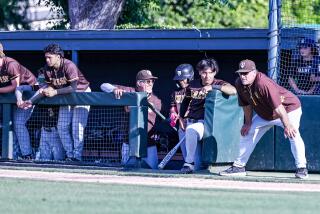Without Bases, the National Pastime Goes Over the Line
- Share via
As defending champions of the unlimited division, Gimps R Us had plenty at stake. But in the third and final inning of their second game, the Gimps were down 3-0 with two men out, and they’d already lost their first game.
“All right, this is it, a two-out rally,” Jerry Newman shouted to teammate Rick Rehhaut, who settled deeper into his wheelchair and brandished a fat plastic bat. “Need three runs. We gotta get five hits.”
Came the pitch, and Rehhaut connected, but the ball failed to go the necessary distance on the fly as prescribed by the rules for Over the Line wheelchair softball. An automatic out.
“Good game, guys,” Newman called to the three young men who made up the opposition K Rippers. The teams wheeled into a loose circle and the players tapped fists. Then the squads rolled to the marked sections of Parking Lot G4 at Cal State Northridge on Saturday to play their third-round games.
The teams were playing in the 14th annual Over the Line wheelchair tournament, sponsored by the city of L.A. Department of Recreation and Parks, the Valley Therapeutic Recreation Center, Northridge Hospital Medical Center and the university.
Teams in the unlimited division are composed of three players, one of whom may be able-bodied.
Teammates pitch to one another. A batter gets two pitches, and if he fails to hit one on the fly in fair territory across the requisite line for his degree of disability -- lines are five, 10, 15 and 25 feet from home -- he is out. He is out also if a fielder catches the ball on the fly or on one bounce or, in the case of a quadriplegic fielder, gets close enough for the ball to hit him or his wheelchair on the fly or first bounce.
This is why quadriplegic fielders play closest to the batter. “They sacrifice their bodies,” Rehhaut said. “They can’t really feel it when they get hit.”
Batters may use aluminum softball bats or oversized plastic bats, the latter of which are usually preferred by quadriplegics or those who have difficulty maintaining their balance while swinging.
One of the K-Rippers, 23-year-old Kevin Fluke, has to have a plastic bat taped into his hands by a teammate.
“I don’t have any finger movements at all,” said Fluke, whose much-tattooed arms and legs have atrophied since he damaged his spine snowboarding 2 1/2 years ago. One of his teammates is Raymond Moshola, an able-bodied friend who was with him on his fateful trip to Mountain High.
Those who use aluminum bats usually swing one-handed so they can stabilize themselves with their other hand.
In Over the Line play, there is no base running because there are no bases. Three hits automatically score a run, as does every subsequent hit.
Much like softball to able-bodied athletes, Over the Line ball “is one of the least physically taxing things we do,” said Newman, a 41-year-old city parking ticket clerk and paraplegic who also plays basketball, football, tennis and ground hockey and who skis on both water and snow. “But it’s definitely one for beginners to come out and try. We don’t take it too serious.”
Rehhaut was subbing for a regular member of Gimps R Us, said teammate Tim Kelley, a 43-year-old welding student. “Our usual guy is a quadruple amputee, but he couldn’t make it because his van broke down or something,” he said.
Rehhaut, who is paralyzed from the chest down, was more than happy to have a chance to compete. “The doctor broke my back at birth, so I’ve kind of adapted to everything,” said Rehhaut, a substitute teacher at Chaminade High School in West Hills and a seller of adaptive golf equipment for the disabled.
“Last week I was water skiing down in Long Beach. I’m a firm believer that the disabled -- or people with disabilities, or whatever the politically correct term is nowadays -- can do everything.”
The tournament was a festival of good humor. Opposing players permitted more profoundly disabled adversaries to bend some of the rules. Volunteers misted fielders stationed in the sun with chilled water from spray bottles and chased down fugitive balls.
In third-round play, the K-Rippers lost to Git-Er-Done, whose players had traveled from Arizona for the tournament.
Gimps R Us, on the other hand, exploded for 11 runs against the opposing team (named the Opposing Team), thus causing the mercy rule to be invoked.
In the end, the day belonged to Git-Er-Done, victors over the K-Rippers again in the title game.
“We kind of came back in the last game trying to win that third-place trophy,” Rehhaut said, “but oh well. It was a fun tournament and that’s what weekends are for. We should all get out and play.”
More to Read
Go beyond the scoreboard
Get the latest on L.A.'s teams in the daily Sports Report newsletter.
You may occasionally receive promotional content from the Los Angeles Times.










